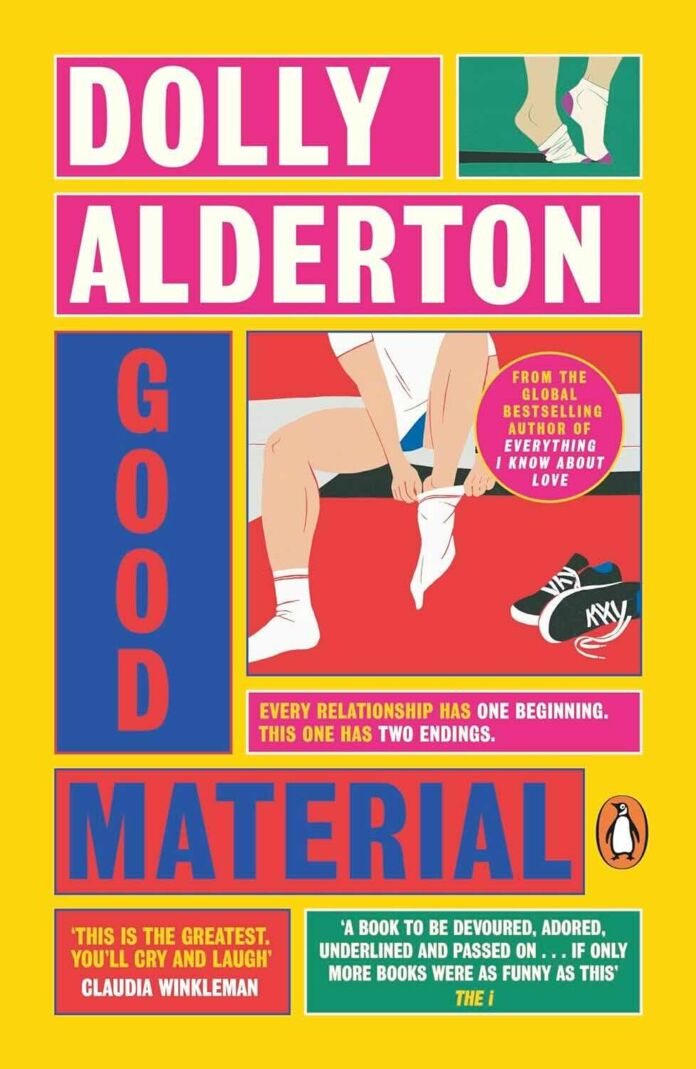In her second novel, Good Material, Dolly Alderton proves once again why she’s considered one of the most astute observers of millennial relationships. Following the success of her debut novel Ghosts and her memoir Everything I Know About Love, Alderton delivers a painfully honest and often humorous examination of a break-up from both sides of the story.
The Story
Set in contemporary London, Good Material by Dolly Alderton follows Andy, a 35-year-old struggling comedian whose life unravels when his girlfriend of four years, Jen, unexpectedly ends their relationship. The narrative initially follows Andy’s perspective as he spirals through the stages of heartbreak while living in various temporary accommodations—his mother’s house, a narrowboat, and finally with an eccentric elderly landlord named Morris. The second half of the novel gives us Jen’s perspective, revealing the complex reasons behind her decision to end the relationship.
Writing Style and Technical Mastery
Alderton’s prose is sharp, witty, and devastatingly precise. She has a remarkable ability to capture the minute details of modern relationships and break-ups:
- The obsessive Instagram stalking
- The well-meaning but sometimes misguided advice from friends
- The physical manifestations of emotional pain
- The desperate attempts to understand what went wrong
Her command of dialogue is particularly impressive, with conversations that feel authentic and revelatory. The author excels at creating distinct voices for her characters while maintaining a consistent narrative tone.
Character Development
Andy
The novel’s protagonist is masterfully drawn—flawed but deeply sympathetic. His journey through grief is painfully realistic, complete with ill-advised attempts at dating, excessive drinking, and an obsessive need to understand why the relationship ended. Alderton manages to make Andy’s pain palpable without making him pathetic, and his humor genuine without being glib.
Jen
Though we don’t get her perspective until later in the novel, Jen emerges as an equally complex character. Her struggles with societal expectations, career pressures, and personal identity create a nuanced portrait of a woman questioning conventional life choices.
Supporting Characters
The secondary characters are equally well-drawn:
- Morris, the conspiracy-theorist landlord
- Avi and Jane, the married friends caught between both parties
- Andy’s supportive but realistic mother
- The various comedy circuit characters who populate Andy’s professional life
Structural Innovation
One of the novel’s greatest strengths is its structural choice to present both sides of the break-up. This approach allows Alderton to explore how the same relationship can be experienced differently by two people, and how personal growth sometimes means growing apart.
Themes and Analysis
The novel expertly explores several interconnected themes:
- The nature of modern relationships and commitment
- The impact of societal expectations on personal choices
- The role of timing in relationship success
- The challenge of maintaining individual identity within a partnership
- The different ways men and women process emotional pain
Cultural Commentary
Alderton’s observations about millennial life are spot-on, particularly regarding:
- The pressure to achieve certain life milestones by specific ages
- The impact of social media on relationships
- The changing nature of friendship in your thirties
- The struggle to maintain artistic dreams while facing financial realities
Strengths
The novel’s greatest achievements include:
- Its unflinching honesty about relationship dynamics
- The balance of humor and heartbreak
- The authenticity of its character voices
- Its resistance to easy answers or conventional resolution
Areas for Improvement
While generally strong, the novel has a few minor weaknesses:
- Some readers might find the pacing in the middle section slightly slow
- Certain supporting characters could be more fully developed
- The comedy scene backdrop occasionally feels underdeveloped
Comparison to Other Works
Good Material by Dolly Alderton stands alongside other contemporary relationship novels like Sally Rooney’s Normal People and Emma Jane Unsworth’s Adults, but brings its own unique perspective to the genre. Alderton’s background in journalism and memoir writing gives her fiction a distinctive authenticity.
Impact and Relevance
The novel resonates particularly strongly in our current cultural moment, where traditional relationship trajectories are being questioned and redefined. It speaks to anyone who has ever experienced heartbreak, but particularly to millennials navigating the complex landscape of modern romance.
Technical Excellence
Alderton demonstrates particular skill in:
- Maintaining consistent character voices
- Creating believable dialogue
- Balancing humor with emotional depth
- Crafting memorable scenes and set pieces
Final Assessment
Good Material is a significant achievement that confirms Dolly Alderton’s place as one of our most insightful chroniclers of contemporary relationships. While the subject matter might seem familiar, her treatment of it is fresh, honest, and deeply affecting.
Recommended for:
- Readers who enjoy contemporary relationship fiction
- Fans of Sally Rooney and Emma Jane Unsworth
- Anyone processing a break-up
- Those interested in stories about modern millennial life
- Readers who appreciate dual-perspective narratives
Conclusion
Good Material by Dolly Alderton is more than just another break-up story – it’s a nuanced examination of how we love, lose, and eventually find our way forward. Alderton’s keen eye for detail and deep empathy for her characters make this a compelling and ultimately hopeful novel about the necessity of growth and change in relationships.
The book serves as a reminder that sometimes what feels like an ending is actually a beginning, and that understanding someone else’s perspective doesn’t always mean getting back together. It’s a mature, insightful, and ultimately satisfying exploration of modern love in all its complexity.





